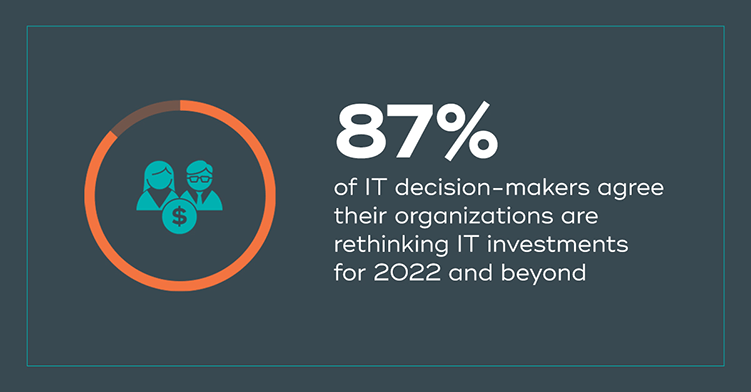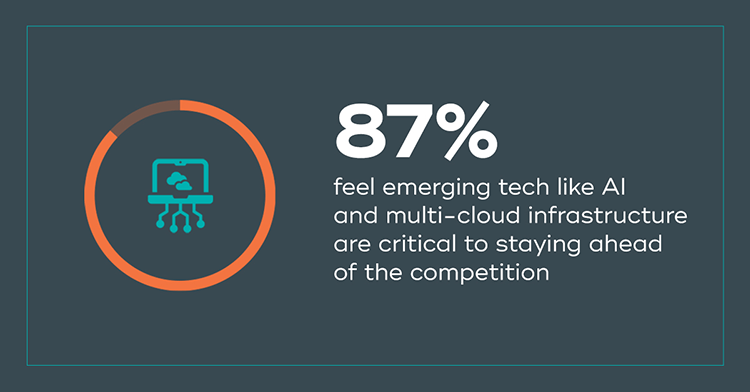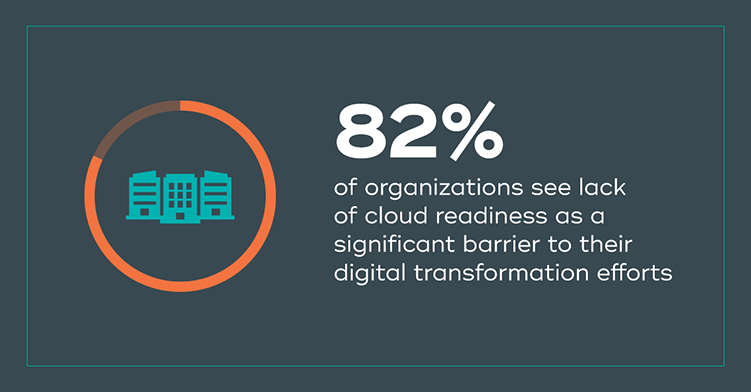Teradataについて
Teradataは、自律型AIの時代に向けて、企業のAI活用を支えるプラットフォームとサービスを提供します。AIとナレッジを統合した「AIナレッジプラットフォーム」と包括的なAIサービスにより、業務の深い知見と全社的なコンテキストを踏まえたAIソリューションの導入から本番運用までを支援します。データがクラウド、オンプレミス、ハイブリッドのどこにあっても統合・接続し、AIの本番運用に求められる性能とスケールを実現します。詳しくは Teradata.jpをご覧ください。
Organizations know that having the right IT in place and leveraging a cloud-first and data-centric mentality is essential in today’s digital economy. However, to advance their digital transformation initiatives and fully realize the possibilities that emerging technologies -- like AI, IoT and multi-cloud – offer, organizations must first reevaluate how they invest in IT.
A new research report, commissioned by Teradata (NYSE: TDC) and conducted by independent research firm Vanson Bourne in August 2021, explores global sentiment around data-driven transformation investments this year and beyond, and reveals where organizations are placing their bets to set themselves up for success in the years to come.

Market Volatility is Shifting 2022 IT Investments
In the wake of the pandemic’s economic impact, 87% of companies are reportedly rethinking IT investments for 2022 and beyond, mainly due to the recent, significant shifts in consumer spending and market uncertainty.
Emerging Tech is a Global Priority

Looking three years ahead, IT decision-makers also identified emergent technologies, such as multi-cloud infrastructure, IoT, 5G, edge computing, AI, and data analytics, as critical areas for increased future spend. This was a globally held view, with IT leaders from the U.S., Europe, and the Asia Pacific Japan regions citing emerging technologies as a top investment priority.
“Today, organizations understand that they must leverage key emerging technologies such as AI and multi-cloud infrastructure to maintain a competitive advantage. In fact, 87% of IT decision-makers felt they would be at risk of lagging behind the competition if they didn’t,” said Steve McMillan, President and CEO of Teradata. “To realize their full potential, companies must modernize their architectures to leverage the cloud and dial-up investments in other emerging technologies initiatives, like achieving AI at scale or leveraging the intelligent edge. In doing so, they can combine new innovative sources of data with their own to gain the necessary insights to pivot on a dime and continue to fuel innovation at scale.”
Lack of Cloud-Readiness Undermines Digital Transformation
As IT leaders move forward with plans to pivot their digital innovation strategies in the wake of the pandemic, they also grapple with how quickly they make their leap to the cloud.

Methodology
In August 2021, Teradata commissioned independent market research company Vanson Bourne to conduct a quantitative research study of IT and business decision-makers across the U.S., UK, France, Germany, China, Singapore, Japan, Australia, and India. Respondents were from organizations with 1,000 employees or more. The organizations could be from various private or public sectors, including Business and Professional Services; Financial Services; IT, Tech, and Telecoms; Retail, Distribution, and Transport; Manufacturing, and other Commercial Sectors. Interviews were conducted online using a rigorous multi-level screening process to ensure that only suitable candidates participated.
About Vanson Bourne
Vanson Bourne is an independent specialist in market research for the technology sector. Their reputation for robust and credible research-based analysis is founded upon rigorous research principles and their ability to seek the opinions of senior decision-makers across technical and business functions, in all business sectors, and all major markets. For more information, visit www.vansonbourne.com.
Teradataは、自律型AIの時代に向けて、企業のAI活用を支えるプラットフォームとサービスを提供します。AIとナレッジを統合した「AIナレッジプラットフォーム」と包括的なAIサービスにより、業務の深い知見と全社的なコンテキストを踏まえたAIソリューションの導入から本番運用までを支援します。データがクラウド、オンプレミス、ハイブリッドのどこにあっても統合・接続し、AIの本番運用に求められる性能とスケールを実現します。詳しくは Teradata.jpをご覧ください。